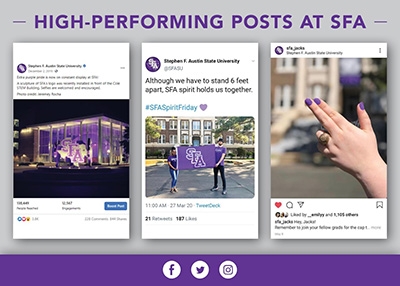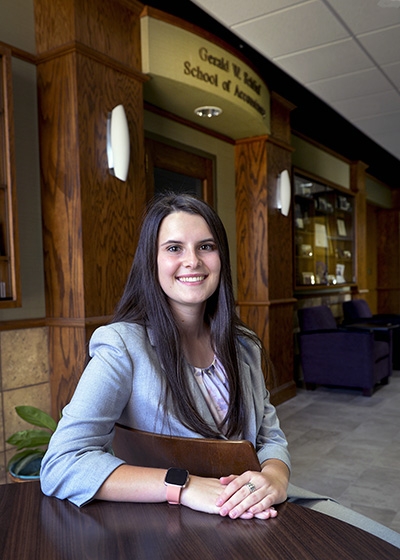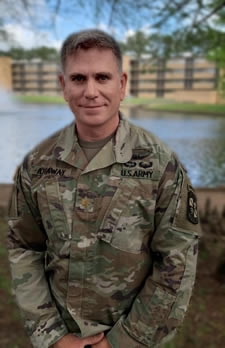SFA University
For SFA Director of Student Engagement, work is based on experience.
September 18, 2020 - Saville Harris meets a lot of students.
Saville Harris, assistant director of student engagement and Greek life, is one of four President’s Achievement Award recipients for 2020, as recently announced by Dr. Scott Gordon, SFA president.
In his role as assistant director of student engagement and Greek life, and in the years leading up to his current position, Harris has befriended, inspired and even consoled hundreds of Stephen F. Austin State University undergrads.
The names and faces might change each year, but Harris’ go-to mantra remains the same: “A few simple words can make someone’s day.”
Harris is one of four President’s Achievement Award recipients for 2020, as recently announced by Dr. Scott Gordon, SFA president. Harris, known for his towering height and booming personality, has been winning campus awards since 2012. But this year, amid the COVID-19 pandemic, perhaps news of the accolade arrived a bit more sweetly than it had in the past.
“I was shocked,” he said. “It made my heart smile.”
Reading through Harris’ résumé takes a few minutes: adjunct professor of kinesiology, author and presenter of scholarly publications, Purple Santa actor, orientation facilitator, Alpha Phi Alpha fraternity member, Jack Camp and Spirit Rally host, and lifetime member of the SFA Alumni Association. He also was recently appointed to the committee leading the search for SFA’s next vice president for student affairs.
The question should be, what hasn’t he done? And the simple answer is, earn his PhD. But if you ask him, that just might be the next frontier.
According to the letter of nomination, Harris is “a living, breathing definition of what SFA stands for in our mission statement and goals.” He has definitely earned that characterization, but that’s not why he came here. Harris, then a teenager coming to grips with the fact that his gridiron dreams had been shattered by a serious injury, followed his older brother Robert to Nacogdoches from hometown Livingston in 2006.
After earning his bachelor’s in 2010, he considered leaving. He applied for and received callbacks for a few jobs. But a campus contact convinced him to stay in town for his master’s, and since 2013, he has established himself as a fixture in student engagement. Along the way he fell in love and married wife Ashley, herself an SFA alumna, and had two daughters, ages 1 and 7. In his spare time, he operates a food truck, Big Fella’s BBQ, which in normal times can be found on weekends at Fredonia Brewery or the Nacogdoches Public Library.
By any measure, Harris has a great life, one that started 14 years ago when he headed north on Highway 59.
“Everything that I wasn’t, I found here,” he said.
While that may be true, it’s not the whole story.
His parents, Florida and Sylvester Harris, own and operate a restaurant in Livingston, Florida’s Kitchen. Since Harris is only 32 years old and the restaurant has been around for 35 years, it’s safe to say that Harris grew up in the hospitality industry. And that experience helped shape who he is and what he means to SFA.
“It taught me how to work with people,” he said. “You have to learn how to take the good with the bad and learn how to make people happy. I learned that at an early age. You can always treat somebody well.”
By Richard Massey, Senior Marketing Communications Specialist at Stephen F. Austin State University
September 18, 2020 - There is a positive outlook among administrators at Stephen F. Austin State University, as fall 2020 enrollment numbers were much better than many educational forecasts had predicted, based on the impacts of the COVID-19 pandemic.
Fall enrollment totaled 12,620 students, a decrease of 349 students, or 2.7%. However, there was a 10.7% increase in SFA’s graduate enrollment, from 1,475 students in fall 2019 to 1,633 students in fall 2020.
“Among the graduate students, there was a 36.5% increase in the number of new graduate students, so that is especially encouraging,” said Erma Brecht, executive director of enrollment management. “SFA’s commitment to flexible course and program offerings allowed graduate students to select options that best fit their needs, such as 16-week or 8-week terms and face-to-face, online, Zoom or a hybrid delivery.”
Within undergraduate enrollment, administrators believe the decrease in freshman students, from 3,643 in fall 2019 to 3,109, is due to pandemic-related uncertainty. Enrollment of junior-level students increased 2.1%, from 2,639 in 2019 to 2,694; there was a 3.8% increase among seniors, from 2,895 to 3,005.
Each of the six colleges experienced growth in their graduate-student headcount, with the Perkins College of Education enrolling 874 students, an 8.2% increase since fall 2019, and the College of Liberal and Applied Arts enrolling 287 students, a 22.1% increase. There are 143 graduate students in the Rusche College of Business, 79 in the College of Fine Arts, 91 in the Temple College of Forestry and Agriculture, and 159 in Sciences and Mathematics.
SFA administrators were especially pleased with retention rates, which indicate a potential 7% increase, from 70% in fall 2019 to 77% this fall.
“We are pleased to see our students return to continue their educational goals at a higher rate,” Brecht said.
Brecht added that SFA faculty, staff and administrators understood this fall was going to look and feel different than normal.
“Faculty and staff prepared course offerings in multiple modalities to meet students' needs and provided student services virtually,” she said. “We thank them for their dedication, and we also thank our students and their families for their commitment to SFA.”
For more information about SFA enrollment, visit sfasu.edu/admissions.
September 16, 2020 - As National Family Day, Sept. 26, approaches, the School of Human Sciences at Stephen F. Austin State University wants to remind you about a bachelor’s degree that you can earn online to serve families at all stages of life.
The Bachelor of Science in human sciences with a concentration in human development and family studies was the first completely online bachelor’s degree at SFA. As part of its online study, the program offers opportunities to connect with alumni and industry professionals virtually.
“This flexible learning experience is a great option for those who do not want to relocate to Nacogdoches,” said Dr. Rachel Jumper, assistant professor of human sciences at SFA.
Those who earn this degree pursue careers as adoption and foster specialists, childcare workers, early intervention specialists, marriage and family enrichment program coordinators, patient advocates, senior center activities coordinators and youth program coordinators.
Adrian Gutierrez, a 2016 graduate of the program, is now a juvenile case manager for the City of Baytown Municipal Court.
“Each course provided knowledge of every aspect of lifespan development while expanding my understanding of the value of communication and relationships,” Gutierrez said. “I highly recommend this program to anyone with a passion for working with and helping children and families grow.”
The human development and family studies program offers new, returning and transfer students the opportunity to earn an undergraduate degree online. It provides an in-depth understanding of growth, change and development in children, adults and families. It also features a lifespan, multicontextual and family systems approach, which has proven essential for service-oriented professions.
For more information, contact Jumper at jumperr@sfasu.edu, or visit sfasu.edu/sfaonline.
September 15, 2020 - Teacher candidates in Stephen F. Austin State University’s Community Responsiveness and Engaged Advocacy in Teacher Education program, or C.R.E.A.T.E., have partnered with the Nacogdoches Public Library to provide free real-time drop-in homework help for local students.
“We know there is a lot of need in the community right now, with so many parents, grandparents and caregivers working to help their children learn from home,” said Dr. Heather Olson Beal, professor in SFA’s James I. Perkins College of Education. “We also hope this service is helpful to teachers, who can recommend that their students join the homework help sessions.”
The library is hosting free virtual drop-in sessions for teacher candidates to answer quick homework questions from 9 to 11 a.m. on Mondays and from 4 to 6 p.m. on Thursdays throughout September on the Discord meeting platform.
The homework sessions are open to all local students, but students age 13 and younger will need a caregiver or guardian to register for them. To participate, visit sfasu.edu/create-hwhelp.
The library also is hosting a continuation of the free virtual activity lessons teacher candidates in C.R.E.A.T.E. began last spring when schools were shut down because of COVID-19. While providing a fun break during the day for children and their families and caregivers, these activities help teacher candidates give back to the community while gaining valuable online teaching experience.
Students can participate in these activities from 1 to 2 p.m. on Wednesdays and from 10 to 11 a.m. on Fridays throughout September. The lessons include art activities and science experiments designed for students in kindergarten through sixth grade.
Caregivers and guardians can register students for these activities at sfasu.edu/create-activity.
“We think this is a great way to promote community while helping both local families navigating virtual learning and SFA teacher candidates working to gain real-world experience during the pandemic,” said Crystal Hicks, librarian at the Nacogdoches Public Library.
Depending on response, the sessions may continue beyond September, said Dr. Lauren Burrow, an associate professor in the Perkins College of Education.
“C.R.E.A.T.E. always tries to prioritize community needs and respond, creatively, so as the school year progresses, we’ll assess interest in these sessions and continue them as needed,” Burrow said.
To learn more, email Burrow at burrowle@sfasu.edu.
September 10, 2020 Nacogdoches — In light of the COVID-19 pandemic, Stephen F. Austin State University’s SFA Gardens is introducing a modified version of its popular fall plant sale known as the Fabulous Fall Festival.
Plant sale patrons will have the opportunity to reserve a two-hour window to shop in the SFA Gardens plant nursery throughout the month of October. Up to six plant sale patrons may shop during the same two-hour window, and all physical distancing measures must be observed.
Reservation windows will occur between 9 a.m. and 3 p.m. Monday through Friday October 1 through 30, with two Saturday opportunities on October 3 and 17.
The sale will feature more than 300 varieties of hard-to-find, “Texas-tough” plants, including Texas natives, edibles, heirlooms, perennials, shrubs and trees, with an emphasis on pollinator friendly selections, as well as exclusive SFA introductions. The featured plants are extensively trialed before being offered to the public and are produced by SFA Gardens staff and volunteers.
All proceeds support staff members and operations within the Mast Arboretum, Pineywoods Native Plant Center, Ruby M. Mize Azalea Garden and Gayla Mize Garden.
Reservations will begin September 18 and may be made online at sfagardens.org and on SFA Gardens’ Facebook and Instagram pages. Reservations are required, and participants must wear a mask in all buildings. Additionally, the much-anticipated plant list will be released in conjunction with the reservation. Cash will not be accepted, but checks and all major credit cards are welcome.
Parking will be available at the Pineywoods Native Plant Center, located at 2900 Raguet St. Carts will be provided. For more information, email dawnstover@sfasu.edu.
September 1, 2020 - All online degree programs in Stephen F. Austin State University’s Rusche College of Business will be converted to an eight-week format by spring 2021. The college has already started the process of moving classes to the new model, which will replace the traditional 16-week schedule.
“The advantage with the eight-week course format is that if offers our online students more flexibility within their academic schedules,” said Dr. Tim Bisping, dean of the Rusche College of Business. “They can focus on a couple of classes at a time and still be full-time students. It also provides options for students who may need to temporarily stop and restart their program of study due to unforeseen circumstances. Many college students today balance work, family and other issues while pursuing their degree. We want to make sure that our course offering structure is not an obstacle, but an asset to students as they seek flexible ways to complete their degree.”
By spring, the college will host three undergraduate degree programs in this format – General Business, Sports Business, and Business Communication and Corporate Education. While flexible options are the goal, research also indicates that shorter course delivery may improve student outcomes.
“Studies show that students have a higher rate of success with the eight-week courses versus extended weeks, said Dr. Steve Bullard, SFA provost and VP of academic affairs. “Our ability to meet students where they are is essential to student success. With the flexibility, potential cost savings, and favorable outcomes, it makes so much sense for our online programs to offer the 8 week schedule.”
Dr. Scott Gordon, SFA president, said the pro-active steps being taken by the college provide an outstanding example of educational leadership.
“Providing ultimate flexibility to our students through the innovative use of technologies and flexible course design and delivery is a foundational component of the new model for higher education,” Gordon said.
For more information about the eight-week online class format, contact Dr. Tim Bisping at bispingto@sfasu.edu or 936.468.3101.
August 31, 2020 - Among 338 universities researched, Stephen F. Austin State University ranked No. 32 nationally and No. 3 in Texas for social media engagement — a metric of growing importance in an increasingly virtually connected world.
“I’m proud to see University Marketing Communications’ social media team recognized for its exceptional work,” said Dr. Scott Gordon, SFA president. “Social media engagement has been growing in importance throughout the past decade and has been particularly valuable during the global pandemic. As plans continue to evolve at a rapid pace around the world, it will remain a front-line tool for sharing those changes.”
Rival IQ, a social media analytics company, conducted the higher education social media engagement study by surveying content posted between June 1, 2019, and May 31, 2020, on three main platforms: Instagram, Facebook and Twitter.
“SFA is ranked in the top 10% among universities for overall consistent, steadily engaging accounts encompassing all social media platforms,” said Dr. Shirley Luna, SFA’s executive director of University Marketing Communications. “It’s imperative SFA keeps its audience engaged because it is one of our main forms of communication with current and prospective students, alumni, and the SFA and Nacogdoches communities.”
Using survey data and a weighted formula, Rival IQ generated an overall engagement ranking for each school that blends total engagement with engagement rates, according to its report. Rather than simply comparing total clicks, likes or shares, this type of weighted formula reveals true engagement percentages so that a larger university’s sheer number of followers doesn’t bury smaller universities with a naturally lower follower base.
“Engagement rate evens the playing field between accounts with varying audience sizes,” said Kerry Whitsett, SFA University Marketing Communications social media specialist. “Obviously, an account with 100,000 followers will have more comments on any given post than an account with 20,000. So, rather than comparing total number of comments on a post, it compares the number as a percentage in relation to the number of the account’s followers.”
SFA’s ranking far surpassed other Texas universities of similar size: Texas State University ranked No. 105, Sam Houston State University ranked No. 151, and Lamar University ranked No. 267.
“One of the reasons SFA is ranked so high is because the marketing team communicates with its followers — and our communication is not one way,” Whitsett said. “We like and make comments on posts, we answer questions, and we congratulate people when they post about being accepted to SFA and upon graduation. We tell people visiting our campus, ‘We hope you enjoyed your day at SFA!’ We want our audience to know SFA is actively engaged with them.”
Of the three individual platforms, SFA’s performance on Twitter was the best ranked, landing the No. 12 position nationally.
As of August 2020, SFA has 20,800 followers on Twitter, 18,800 on Instagram, and more than 75,000 on Facebook with each platform comprising its own unique audience.

Rival IQ, a social media analytics company, ranked Stephen F. Austin State University No. 32 among 338 universities nationally and No. 3 in Texas for social media engagement — a metric of growing importance in an increasingly virtually connected world. Pictured here are snapshots of one high-performing post from each of SFA’s main platforms.
August 25, 2020 - One Stephen F. Austin State University student doesn’t have to worry about paying for the review courses and registration fees associated with the four-part Uniform CPA Examination she’ll take next year.
Nicole Phifer, a graduate student in accountancy at the Rusche College of Business, recently received an important windfall – a $10,000 scholarship from the Public Company Accounting Oversight Board, a nonprofit established through the Sarbanes-Oxley Act of 2002 to oversee the audits of public companies.

Nicole Phifer, a graduate student in the Schlief School of Accountancy, won a $10,000 scholarship from the Public Company Accounting Oversight Board. Phifer is on schedule to finish the five-year Bachelor of Business Administration/Master of Professional Accountancy program in four years and has an internship lined up for spring semester.
The agency’s scholarships are funded through fines assessed on accounting firms across the world. For Phifer, a 21-year-old graduate student from Rusk, the scholarship means she can focus on maintaining her 4.0 GPA, finishing out her coursework, and ramping up her CPA prep this spring. Considering that the CPA cycle can cost in excess of $3,000 – in addition to fall and spring tuition – the scholarship is not just an accolade, but an essential, enabling element of Phifer’s five-year Bachelor of Business Administration/Master of Professional Accountancy program at SFA.
“I didn’t think I was going to get it,” said Phifer, one of 234 students nationwide who received the honor.
Phifer was nominated for the award by Dr. Kelly Noe, director of SFA’s Schlief School of Accountancy.
“She saw potential in me,” Phifer said. “She sees potential in students that they might not see in themselves.”
With Phifer, the potential was not hard to find. She took an accounting course during the fall semester of her first year in 2017 and never looked back. Along with the 4.0 GPA, Phifer worked at University Finance and Administration as a student assistant, is president of accounting honors group Beta Alpha Psi, is a member of business honors society Beta Gamma Sigma, and is a graduate assistant at the business college.
Phifer already has an internship lined up at Henry & Peters in Tyler, a blue-chip regional accounting firm founded in 1929. And if the firm makes an offer for permanent employment, Phifer, who has yet to decide on whether her focus will be on tax or audit, will oblige.
“People talk about going to Dallas or Houston, but Tyler is big enough for me,” she said, noting that her family would be just 40 miles down the road.
According to PCAOB, since 2011 the organization has issued $13.7 million in scholarships to 1,370 students at 473 institutions. The nonprofit reports that women and minority recipients have been on the rise since 2017.
In some instances, the fines that pay for the scholarships are enormous, as was the case last year when a Mexico-based firm and its associates were assessed $530,000. While many settlements involve US companies, plenty include registered firms based in places like Canada, Colombia, Hong Kong, India and South Korea. If the proceeds from an auditing penalty out of Seoul can end up in a place like Nacogdoches, then that’s something Phifer can accept.
“Whoever came up with that idea knew what they were doing,” she said.
By Richard Massey, senior marketing communications specialist at Stephen F. Austin State University
August 25, 2020 - Based on forecasts that indicate Hurricane Laura will be a Category 3 storm at landfall and will impact our area with high winds and rain beginning late Wednesday night, the following operational changes are now in effect at Stephen F. Austin State University:
- Beginning noon Wednesday, Aug. 26, all classes are canceled for the remainder of the week. Classes are expected to resume as scheduled Monday, Aug. 31.
- Beginning at 3 p.m. Wednesday, university offices will be closed for the remainder of the week. Non-essential university employees are released from duties at that time and will be granted emergency leave for work time missed.
- SFA’s Early Childhood Laboratory and Charter School will operate as normally scheduled on Wednesday, but will be closed Thursday and Friday.
- Campus housing and dining will remain open, and students are welcome to remain on campus. Dining hours may be modified based on weather conditions.
- A call center will open at 9 a.m. Wednesday, Aug. 26, and will remain open as needed. The number is (936) 468-3401.
- All Lumberjacks are encouraged to remain aware of weather conditions and to put safety first when making travel decisions.
Updates will be posted at SFA’s University Police Department emergency management page – sfasu.edu/upd/emergency-management/jackalert – and on the university's social media account.
 August 24, 2020 — In setting the example of “being the best,” Stephen F. Austin State University Professor of Military Science James Attaway recently was promoted from the rank of major to lieutenant colonel.
August 24, 2020 — In setting the example of “being the best,” Stephen F. Austin State University Professor of Military Science James Attaway recently was promoted from the rank of major to lieutenant colonel.
“Being promoted to lieutenant colonel means a lot to me,” Attaway said. “I started in the Army as a private more than 20 years ago and plan to retire in a few years with my final rank as a lieutenant colonel. It is incredible to think back on all I have experienced.”
Attaway, who graduated from SFA in 2004 with a Bachelor of Science in kinesiology, began his Army career in 1998 when he enlisted as an infantryman. He has since completed training at Ranger, Airborne, and Air Assault schools and more. He has served with numerous units across the world, including Kosovo, Iraq, Korea and Afghanistan.
Attaway was selected as SFA’s chair of military science in 2018. Since then, he has overseen a successful 50-year anniversary for the department, helped establish the 1st Lt. Kile G. West 5K and 10K Memorial Race, and aided the ROTC Ranger Team in winning first place in the Task Force Ranger Challenge for the first time in SFA’s history.
He said he is happy to be “stationed” in Nacogdoches, where he and his family plan to remain after his retirement.
“After 17 years of marriage and 10 moves, it feels really good to be putting down roots,” Attaway said.
Even though his rank has changed, Attaway is still committed to training future Army officers for commissioning.
Despite the challenges brought about by the COVID-19 pandemic, the faculty and staff under Attaway’s leadership have continued to train cadets. Due to safety restrictions, the department is preparing for course modality changes and physical distancing regulations.
“As both Army officers and noncommissioned officers, part of our job is to adapt, overcome and complete missions,” Attaway said. “While COVID-19 has changed how we teach, it hasn’t caused us to stop teaching and mentoring the next generation of Army officers.”









